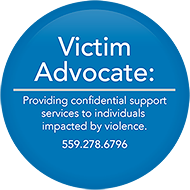Survivor Advocacy Services
Stalking Definitions (CSU System)
Stalking (CSU Executive Order) means engaging in a repeated Course of Conduct directed at a specific person that would cause a Reasonable Person to fear for his/her or others’ safety or to suffer Substantial Emotional Distress. For purposes of this definition:
- Course of Conduct means two or more acts, including but not limited to, acts in which the stalker directly, indirectly, or through Third Parties, by any action, method, device, or means, follows, monitors, observes, surveils, threatens, or communicates to or about a person, or interferes with a person’s property;
- Reasonable Person means a reasonable person under similar circumstances and with the same Protected Status(es) as the Complainant;
- Substantial Emotional Distress means significant mental suffering or anguish that may, but does not necessarily require medical or other professional treatment or counseling.
Stalking is a pattern of behavior that makes you feel afraid, nervous, harassed or in danger. It is when someone repeatedly contacts you, follows you, sends you things, talks to you when you don't want them to or threatens you. Stalking behaviors can include:
- Damaging your property.
- Knowing your schedule.
- Showing up at places you go.
- Sending mail, e-mail, texts and pictures.
- Creating a website about you.
- Sending gifts.
- Stealing things that belong to you.
- Calling you repeatedly.
- Any other actions that the stalker takes to contact, harass, track or frighten you.
You can be stalked by someone you know casually, a current boyfriend or girlfriend, someone you dated in the past or a stranger. Getting notes and gifts at your home, on your car or other places might seem sweet and harmless to other people. But if you don't want the gifts, phone calls, messages, letters or e-mails, it doesn't feel sweet or harmless. It can be scary and frustrating.
Sometimes people stalk their boyfriends or girlfriends while they're dating. They check up on them, text or call them all the time, expect instant responses, follow them, use GPS to secretly monitor them and generally keep track of them, even when they haven't made plans to be together. These stalking behaviors can be part of an abusive relationship. If this is happening to you or someone you know, you should talk to a trusted person.
Stalking is a crime and can be dangerous. California Penal Code section 646.9, in part, states, “Any person who willfully, maliciously and repeatedly follows or willfully and maliciously harasses another person and who makes a credible threat with the intent to place that person in reasonable fear for his or her safety, or the safety of his or her immediate family is guilty of the crime of stalking.....”
- Think about ways you can be safer. This means thinking about what to do, where to go for help and who to call ahead of time
- Where can you go for help?
- Who can you call?
- Who will help you?
- How will you escape a violent situation?
State of California Stalking Statutes
California Cyberstalking Statutes
Source: Stalking Resource Center
Emergency Contact: 911

PHONE: 559-278-6796, #1
E-MAIL:
survivoradvocate@csufresno.edu
HOURS: M-F, 8am-5pm
LOCATION: The Survivor Advocate is located in the Student Health and Counseling Center
